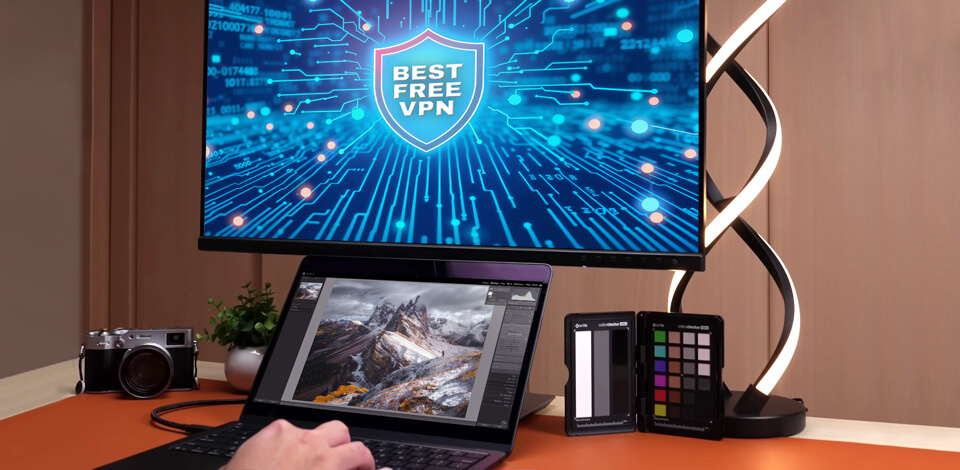
Photographers need the internet for their work – editing, storing, sharing, and social media. But when you travel, some countries block websites, and public Wi-Fi can be risky. Free VPNs are a useful tool to get around these problems safely.
There's a list of countries where VPNs are especially important (but also carry extra risk). Among them:

When American photographers work in other countries, they often use free, reliable VPNs. This helps them get work done, stay safe, and stay connected. Here's why VPNs are so important for them.

Photographers working in other countries should know that VPNs (especially free ones) have risks. However, taking the right steps helps you stay safe from most of them.
Some team members from the FixThePhoto team often use VPNs while traveling. They’re sharing their own tips and advice to help traveling photographers avoid common VPN problems.

If you're a photographer editing on public Wi-Fi anywhere, ProtonVPN's bank-level encryption stops hackers. I safely uploaded client photo galleries from a Bangkok café without fearing hacked connections or stolen passwords.
Tools like social media schedulers, portfolio sites, and Instagram get blocked or run very slowly in some countries. With ProtonVPN, I could easily reach these tools and handle client work while traveling.

I had no problems with delays. Besides, I was impressed with the minimal buffering on different sites and servers. Few options on this list can also bypass the Great Chinese firewall, which is especially useful if you are under surveillance and want your actions on the net not to be public.
Unlike other free VPNs for PC I've tried, ExpressVPN was much faster, even when uploading huge RAW files to client folders or sending finished videos. This speed saves crucial time when working on tight deadlines overseas.

When I work in public libraries or hotel cafés, I always use a VPN before uploading big RAW photo files. NordVPN’s data scrambling and instant disconnect feature (kill switch) meant I stayed safe while syncing thousands of photos to Dropbox or Google Drive – even on unsafe Wi-Fi.
Some countries block or slow down my portfolio websites. With NordVPN, I could open and update my Wix, Squarespace, and Pixieset galleries easily, like I was working from home.

Here you can turn on separate tunneling, double encryption, an emergency disconnection from the network, and a special CleanWeb mode of operation that blocks ads and malware. Additional settings for hiding traffic available in NoBorders mode and Camouflage mode don’t allow tracking that you are using a VPN instead of a direct connection.
Surfshark's growing server network includes over 1,041 servers in almost a third of the world’s countries. This means that your protected connection will always be stable and safe while you’re accessing all sorts of content.

TunnelBear's free VPN lets you connect as many devices as you want at the same time.
It gives you 2GB of data every month – not a huge amount, but plenty for quick tasks like uploading photo galleries, emailing retouched proofs to clients, or visiting blocked websites while traveling.
I like how it lets me switch countries easily to unblock websites or get faster upload speeds. Its kill switch ("VigilantBear") hides your real location if the VPN disconnects.
GhostBear Mode hides your VPN usage, which is critical in countries that block VPNs like China or UAE, where I often travel for work.
To find the best free VPNs for photographers working overseas, our FixThePhoto team, including Kate Debela, Eva Williams, and Ann Young, tested them properly: during actual trips, in real countries with different internet blocks, just like traveling photographers would.
We conducted our tests in five real-world locations like the U.S., Türkiye, Thailand, Germany, and UAE, where photographers often deal with blocked websites, slow connections, or unsafe Wi-Fi.
Our team performed actual photography tasks: uploading/downloading RAW & JPEG files, syncing Lightroom catalogs, accessing Adobe Creative Cloud and Google Drive, checking stock photo sites, and trying to post on Instagram/Pinterest (which were blocked or unreliable in some areas).
For this free VPN review, we evaluated tools in common remote workspaces like cafés, hotels, and co-working spots – testing their connection speed, stability, monthly data allowances, and ability to reach U.S. services like Adobe or Gmail, while monitoring privacy safeguards and whether they triggered account security alerts or login failures on our everyday platforms.
We simply wanted to know if free VPNs could do three things: keep our files and messages safe, let us reach the websites and apps we required, and work without causing problems. A few were surprisingly good for no money.
Others were so bad that they made us really value paid VPNs. However, the truest test happened when we used them during real trips. With real client deadlines and real photo editing work that couldn't risk failing, this showed us without doubt what photographers can actually trust.